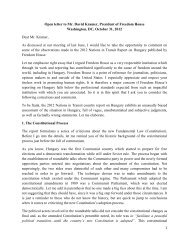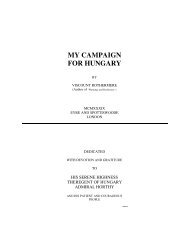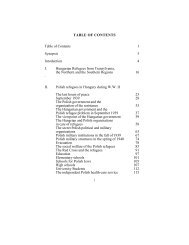The Fate of Western Hungary 1918-1921 - Corvinus Library ...
The Fate of Western Hungary 1918-1921 - Corvinus Library ...
The Fate of Western Hungary 1918-1921 - Corvinus Library ...
Create successful ePaper yourself
Turn your PDF publications into a flip-book with our unique Google optimized e-Paper software.
closed case – Please do something, at least let us save Sopron. (…) On hearing<br />
the above, I immediately issued the necessary instructions within the battalion,<br />
as well as to the associated irredentist organizations.” 245<br />
<strong>The</strong> then-Foreign Minister, Miklós Bánffy, wrote in his memoirs that the<br />
previously mentioned action plan regarding the situation <strong>of</strong> <strong>Western</strong> <strong>Hungary</strong><br />
was worked out in June <strong>of</strong> <strong>1921</strong> (in actual fact, the first half <strong>of</strong> April) during<br />
meetings chaired by Prime Minister Bethlen. Bánffy sensed exactly that: “<strong>The</strong><br />
Hungarian public (i.e., the nation) felt the handing over as the greatest<br />
humiliation. <strong>The</strong> two <strong>of</strong> us (i.e., with Bethlen—J.B.) also saw it that way.<br />
Hence, we had to do something to prevent it. (…) We were certain that not only<br />
the mostly German-speaking population <strong>of</strong> Sopron but also the local Hungarian<br />
and Croat communities and also the German villages want to stay with us. It is<br />
only the Germans <strong>of</strong> the Pinka [River] valley and along the Lajta [River] that<br />
are drawn to Vienna, and they only because they sell their [fruit and vegetable]<br />
produce in the Austrian capital and Graz.” It is not by accident that Bánffy<br />
notes that organizing the population <strong>of</strong> <strong>Western</strong> <strong>Hungary</strong> posted to be handed<br />
over was not his task, and hence he knew very little <strong>of</strong> the preparations. On the<br />
other hand, he did mention that Interior Minister Gedeon Ráday “very carefully<br />
hid his role, giving the impression that it was the people who were getting<br />
ready to act in response.” 246 Also that neither former prime minister Friedrich,<br />
nor Prónay (according to his cited memoirs) knew that the Hungarian<br />
government was behind the movement.<br />
In the end, armed resistance in <strong>Western</strong> <strong>Hungary</strong> was not organized by Col.<br />
Lehár because he sided with Charles IV in his March <strong>1921</strong> attempt to regain the<br />
throne, for which the new PM, Bethlen, in the weeks after assuming the post on<br />
April 14, forced him into the background and relieved him <strong>of</strong> his command<br />
with the Szombathely division. <strong>The</strong> armed resistance <strong>of</strong> the Borderland was<br />
begun by the Etelköz Association [Etelköz was the first known Hungarian<br />
principality, established circa 830AD. <strong>The</strong> territory was located around the<br />
rivers Dnieper, southern Bug, Dniester, Prut and Siret-ed.] in May, whose<br />
leadership PM Bethlen entrusted to one <strong>of</strong> his trustworthy men, a pr<strong>of</strong>essional<br />
soldier, staff captain Gyula Gömbös 247 because we know from historical<br />
245 Prónay Pál emlékezései az <strong>1921</strong>. évi nyugat-magyarországi eseményekről. Első rész<br />
[Memoirs <strong>of</strong> Pál Prónay <strong>of</strong> the <strong>Western</strong> <strong>Hungary</strong> events <strong>of</strong> <strong>1921</strong>. Part One]. In: Soproni<br />
Szemle, 1986, issue 1, p. 27.<br />
246 Bánffy, 1993, op. cit., pp. 66, 70.<br />
247 Gyula Gömbös, born in 1886. During WWI, he served as a staff <strong>of</strong>ficer with the<br />
XIII. Corps in occupied Serbia, then fought in East Galicia as a captain. He was<br />
wounded in June, 1916. After his recovery, he was posted to the Defense Ministry.<br />
After the armistice, he served as military attache in the Defense Ministry (Nov.-Dec.<br />
<strong>1918</strong>), then head <strong>of</strong> operations for the Balkan theater (Dec. <strong>1918</strong>-Jan. 1919). He<br />
became the first president (Jan. 1919-Jan. 1925) <strong>of</strong> the Right-wing <strong>of</strong>ficers’ alliance,<br />
MOVE, and took a forceful stand against the Leftward shifting Károlyi government. He<br />
was ordered to Nagykanizsa as a staff <strong>of</strong>ficer, at which he had himself placed on<br />
inactive status (Feb. 21, 1919). Four days later, ahead <strong>of</strong> his expected arrest and<br />
103
















